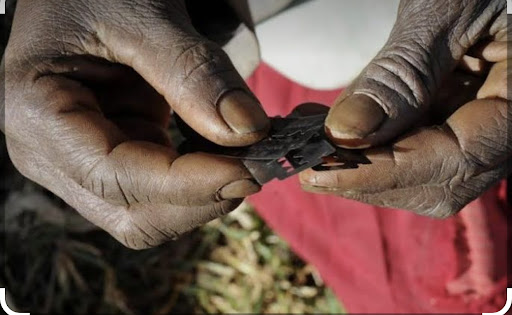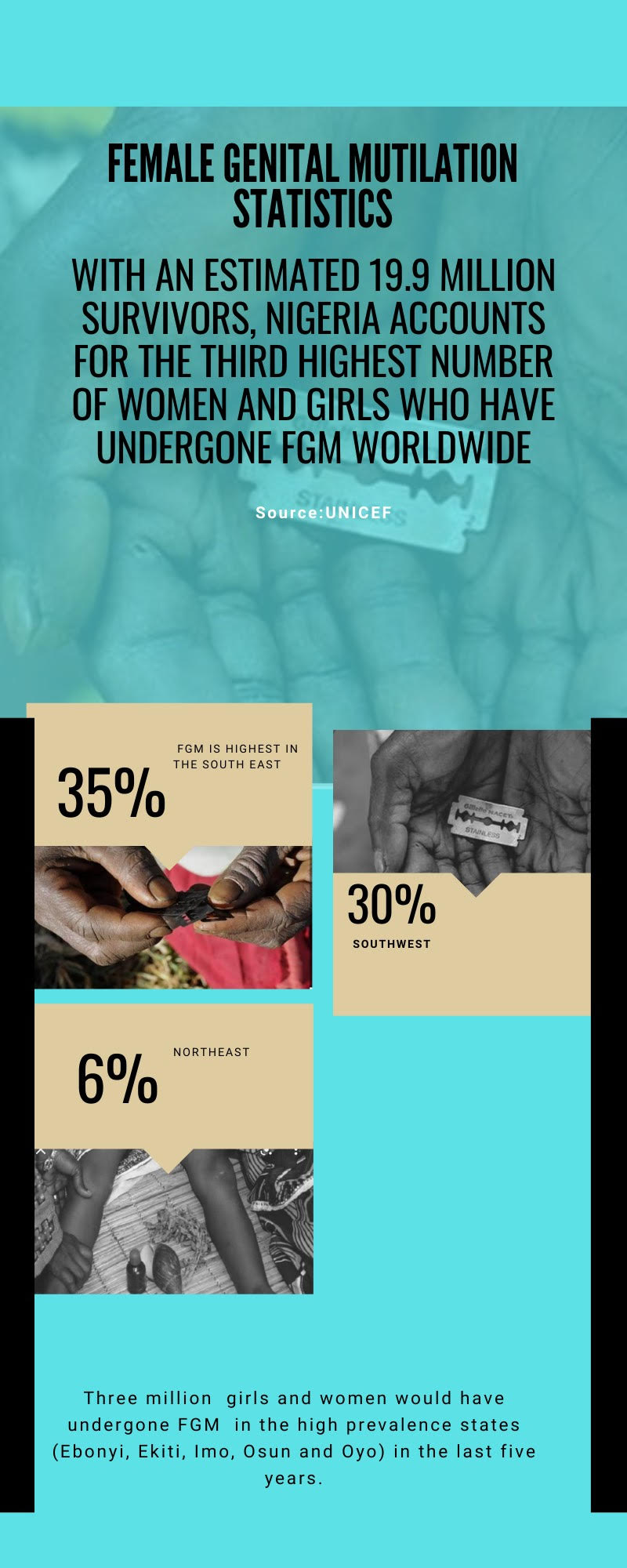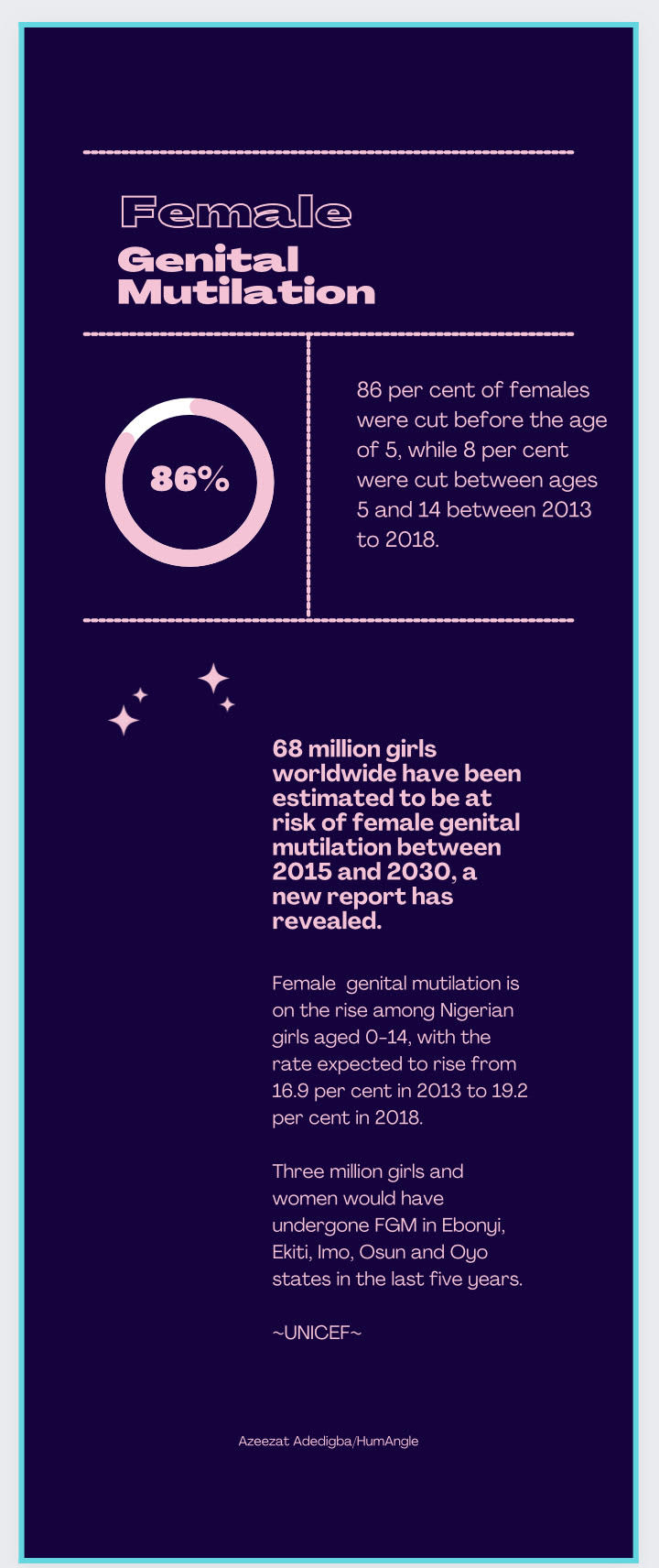Despite Existing Law, Nigeria Has Third Highest Cases Of FGM – Report
Nigeria still account for the third highest cases of Female Genital Mutilation worldwide despite the existence of a law in the country banning the practice

With an estimated 19.9 million survivors, Nigeria accounts for the third highest number of women and girls who have undergone Female Genital Mutilation worldwide, a new report revealed.
In May 2015, former Nigerian President Ebele Jonathan signed Violence Against Persons Prohibition (VAPP) Act against FGM and all other gender-based violence in the country, but the United Nations Children Funds (UNICEF) said in a report released to commemorate the International Day of Zero Tolerance of FGM that the practice remains widespread in Nigeria.
The report revealed that an estimated 68 million girls worldwide are at risk of female genital mutilation between 2015 and 2030.
It said FGM has been on the rise among Nigerian girls aged 0-14, with the rate rising from 16.9 per cent in 2013 to 19.2 per cent in 2018.
How it is done
The World Health Organisation said FGM involves the partial or total removal of external female genitalia or other injuries to the female genital organs for non-medical reasons.
Describing the negative impact of FGM, WHO said it can cause severe bleeding and problems urinating, and later cysts, infections, as well as complications in childbirth and increased risk of newborn deaths.
According to the global health body, there are four types of FGM. The first procedure involves clitoridectomy; removal of some or the entire clitoris.
The second type known as excision, is the removal of some or all of the clitoris and the labia minora (the folds around the vulva).
The third is known as infibulation, which is the narrowing of the vaginal opening through the creation of a covering seal. The seal is formed by cutting and repositioning the labia minora, or labia majora, sometimes through stitching, with or without removing the clitoris.
The fourth type is any procedure done to the female genitalia for non-medical purposes and all four types are practised in Nigeria
Describing the act as a violation of the human rights of girls and women, WHO said the health complications of FGM in 27 high prevalence countries (including Africa, the Middle East and Asia) are estimated to cost 1.4 billion USD per year and is projected to rise to 2.3 billion USD by 2047 if no action is taken.
To tackle the act, world leaders in 2015 agreed and pushed for the elimination of female genital mutilation as one of the targets in the 2030 Agenda for Sustainable Development.
The United Nations set February 6 of every year as International Day of Zero Tolerance for Female Genital Mutilation.
FGM is practised in Nigeria during infancy especially within the first eight days of the child’s birth. Sometimes, it is done before the lady gets married or after the birth of the first child in some cases.
The practice is carried out by traditional birth attendants and some uniformed medical workers using razors and scissors and in some extreme cases, broken bottles, research by HumAngle revealed.

Startling statistics
With an estimated 19.9 million survivors, Nigeria accounts for the third-highest number of women and girls who have undergone FGM worldwide, the UNICEF report showed
While the national prevalence of FGM among women in Nigeria aged 15-49 dropped from 25 per cent in 2013 to 20 per cent in 2018, prevalence among girls aged 0-14 increased from 16.9 per cent to 19.2 per cent in the same period.
An estimated 86 per cent of females were cut before the age of 5, while 8 per cent were cut between ages 5 and 14.
The report also revealed the prevalence of FGM is highest in the Southeast (35 per cent) and South West (30 per cent) and lowest in the Northeast (6 per cent).
Tackling FGM in Nigeria
UNICEF said it is initiating a community-led movement to eliminate FGM in five Nigerian states where it is highly prevalent: Ebonyi, Ekiti, Imo, Osun and Oyo.
The UN agency said about 3 million girls and women would have undergone FGM in these states in the last five years.
“The Movement for Good” will reach 5 million adolescent girls and boys, women – including especially pregnant and lactating mothers – men, grandparents, and traditional, community and religious leaders, legislators, justice sector actors, and state officials through an online pledge to ‘say no’ to FGM, UNICEF said.
It said the movement will mobilise affected communities for concrete action at the household level to protect girls at risk of FGM. It will challenge misconceptions on FGM and the discriminatory reasons it is practiced and break the silence around the practice together with communities.

Experts react
Peter Hawkins, UNICEF Representative in Nigeria said millions of girls are being robbed of their childhoods, health, education and aspirations every day by harmful practices such as FGM.
“The practice of FGM not only has no health benefits – it is deeply harmful to girls and women, both physically and psychologically. It is a practice that has no place in our society today and must be ended, as many Nigerian communities have already pledged to do,” said Hawkins.
Also, Olebe Oluwayemisi, a nurse, said women who have undergone FGM experience a variety of long-term effects, including physical, sexual, and psychological pain during and after the cutting.
“Chronic pain, chronic pelvic infections, the development of cysts, abscesses, and genital ulcers, excessive scar tissue formation, infection of the reproductive system, decreased sexual enjoyment, and psychological consequences such as post-traumatic stress disorder can all occur in women,” Oluwayemisi said.
According to her, a multi-country study conducted by WHO in six African countries found that women who had undergone FGM had significantly increased risks of adverse events during childbirth, and that genital mutilation in mothers has a negative impact on their newborn babies.
Support Our Journalism
There are millions of ordinary people affected by conflict in Africa whose stories are missing in the mainstream media. HumAngle is determined to tell those challenging and under-reported stories, hoping that the people impacted by these conflicts will find the safety and security they deserve.
To ensure that we continue to provide public service coverage, we have a small favour to ask you. We want you to be part of our journalistic endeavour by contributing a token to us.
Your donation will further promote a robust, free, and independent media.
Donate HereStay Closer To The Stories That Matter




